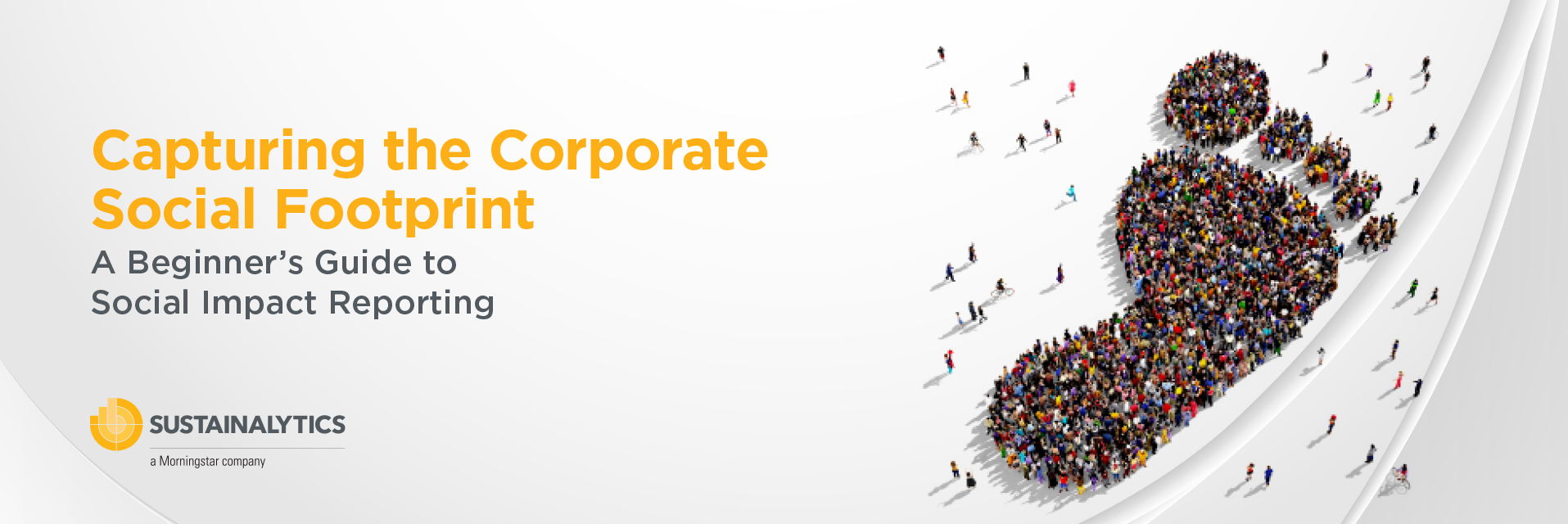An essential aspect of any ESG or sustainability strategy is in how goals, objectives and the work toward meeting targets is disclosed and reported. Sustainability reporting, also known as CSR reporting or ESG reporting, can include information ranging from a firm’s greenhouse gas emissions to its corporate governance practices. But there’s another subset of sustainability reporting that’s recently been adopted by companies to demonstrate their social commitments and prove their value to civil society at large. It focuses on the “S” in ESG, emphasizing the social dimension of sustainability.
Social impact reporting seeks to measure a company’s direct and indirect impacts on stakeholders. As a reporting practice, it measures the socio-economic impacts of an organization’s initiatives or activities on community and society. Environmental impacts are excluded, and there is a strong focus on quantifying impacts over time, such as monetizing a company’s total contribution to GDP or tabulating its effect on community health (see our latest ebook that explains social impact reporting in detail).
Yet social impact reporting isn’t just a communication exercise. Improving brand competitiveness, attracting talent, maximizing investments and mitigating reputational risks are a few of the benefits underpinning the business cases for measuring and communicating your firm’s social impacts. Here are eight business cases to make for leaders that want to make their business’s social impact a priority for their ESG strategy.
Business Case One: Building Stakeholder Awareness and Trust
Demonstrating your company’s value-add to stakeholders through direct and indirect economic growth, education opportunities for employees, community well-being, etc., can advance trust and safeguard your company’s social license to operate. Sharing examples of strong corporate citizenship can also lead consumers to perceive your company and its products as performing better in comparison to competitors.[i]
Business Case Two: Attracting and Retaining Talent
Highlighting your company’s social impacts and related CSR practices can also aid in attracting top talent, especially among younger workers. Nearly 40% of millennials report selecting their employer because their social impact was better compared to other similar employers.[ii] Among Gen Z, over 75% report that working for a firm whose values align with their own is a key factor in their employment decisions.[iii]
Alignment between a company and an employee’s values has also been shown to increase employee engagement and productivity, leading to cost savings from decreased turnover. Employees are more likely to stay with companies offering volunteering and fundraising opportunities to their staff.[iv]
Business Case Three: Demonstrating Value
Quantifying social impacts over time can provide evidence of the value of your company’s social programs, such as diversity and inclusion initiatives, community investments, and supply chain diversity goals, to senior management. While studies exist linking companies’ social initiatives with business performance, shareholders and executive boards may be more likely to continue social initiatives supported by evidence of their value.[v]
Business Case Four: Mitigating Reputational Risks
‘Social washing’ – making unsubstantiated claims or misrepresenting a company to make it appear more socially responsible than it is – can lead to significant reputational risks.[vi] With up to 90% of a company’s sustainability impacts originating in its supply chain, companies should also consider the social impacts of their suppliers to mitigate further reputational risks.[vii] Providing validated proof of your company’s positive social impacts, including across your supply chain, can prevent accusations of social washing and empty marketing statements.
Business Case Five: Identifying Improvement Opportunities
Measuring social impacts can help highlight areas where your company’s impact could be better leveraged, such as greater diversification of supply chain spending or funding essential healthcare services in the communities that you operate in. Some projects aimed at creating positive social outcomes may be eligible for sustainable financing options, including social bonds.
Business Case Six: Ensuring Compliance
With regulatory trends on ESG-related disclosures accelerating, companies can use social impact data to report and demonstrate compliance. Mandatory reporting on the social impacts of a company’s supply chain, in particular, is becoming more widespread, including California’s Transparency in Supply Chains Act and the proposed EU directive on supply chain due diligence. Companies already measuring their social impact data will be better equipped to meet these emerging regulations.
Business Case Seven: Informing Corporate Decision-Making
Social impact data provides valuable insights for your senior management to maximize investment and procurement decisions, including how to best direct their corporate philanthropy efforts to areas of largest impact or which suppliers may amplify the company’s indirect economic impacts.
Business Case Eight: Maintaining Competitiveness
Collecting and reporting on social impacts can provide a competitive edge as a supplier or when tendering for a project. Governments and companies alike are increasingly considering a supplier’s supply chain sustainability in major procurement decisions. In Canada, purchasers in the provincial government of British Columbia must consider social impact with respect to potential suppliers for all major requests for proposals.[viii] Supplier sustainability programs are also growing among top-tier companies, with companies such as 3M and SurveyMonkey prioritizing suppliers with a demonstrated focus on sustainability, including their social impact policies and practices.
These eight business cases for justifying social impact reporting are just a few of the many reasons why this reporting practice is on the rise. Ultimately, it’s about understanding how organizations effect the communities they’re embedded in, and showing that they’re helping to create a better place.
To learn more about social impact reporting for your ESG strategy, read our latest ebook, Capturing the Corporate Social Footprint: A Beginner's Guide to Social Impact Reporting.

Sources:
[i] Stone, E. (2018). “Take 5 How Companies Benefit from Corporate Social Responsibility,“ Northwestern University, accessed (15.06.21) at: https://insight.kellogg.northwestern.edu/article/benefits-of-corporate-social-responsibility
[ii] Peters, A. (2019). “Most millennials would take a pay cut to work at an environmentally responsible company,” Fast Company, accessed (25.05.21) at: https://www.fastcompany.com/90306556/most-millennials-would-take-a-pay-cut-to-work-at-a-sustainable-company
[iii] Network of Executive Women (NEW) (2019). “Welcome to Generation Z,“ NEW, accessed (15.06.21) at: https://www.newonline.org/genz
[iv] Benevity (2018). “Benevity study links employee-centric corporate goodness programs to big gains in retention,” Benevity, accessed (25.05.21) at: https://benevity.com/media/media-releases/benevity-study-links-employee-centric-corporate-goodness-programs-big-gains
[v] Eswaran, V. (2019). “The business case for diversity in the workplace is now overwhelming,“ World Economic Forum, accessed (17.06.21) at: https://www.weforum.org/agenda/2019/04/business-case-for-diversity-in-the-workplace/
[vi] Marsh, A. (2020). ‘‘’Social Washing’ Is Becoming Growing Headache for ESG Investors,’’ Bloomberg, accessed (17.06.21) at: https://www.bloomberg.com/news/articles/2020-04-09/-social-washing-is-becoming-growing-headache-for-esg-investors
[vii] Bové, A. and Swartz, S. (2016), ‘Starting at the source: Sustainability in supply chains,’ McKinsey & Company, accessed (24.06.21) at: https://www.mckinsey.com/business-functions/sustainability/ourinsights/starting-at-the-source-sustainability-in-supply-chains
[viii] Province of B.C., “Social Impact Procurement Guidelines,” official website for the Province of B.C., accessed (15.06.21) at: https://www2.gov.bc.ca/gov/content/governments/services-for-government/bcbid-resources/reference-resources/social-impact-procurement-guidelines
Recent Content
Risk and Opportunity in Biodiversity: How Sustainable Finance Can Help
This article outlines how biodiversity loss poses material risks to business and how it connects to many other issues that companies can’t ignore. In addition, it covers how biodiversity conservation presents substantial economic opportunities, and how businesses can address and access these opportunities by issuing linked instruments that integrate biodiversity considerations.
Today’s Sustainable Bond Market: Boosting Confidence in Sustainable Bond Issuances
In this article, we examine the kinds of sustainable bonds offered in the market, some of the key regulations being developed in different markets and the current initiatives to improve the quality and credibility of issuances.
Webinar Recap: How Integrating ESG Can Drive Opportunity for Private Companies
Recently, Morningstar Sustainalytics hosted a webinar – ESG in the Lifecycle of a Private Company: How Stakeholder Demands Drive Sustainability in Private Markets – to address some of the questions private companies might have surrounding ESG and how it could impact their business.




